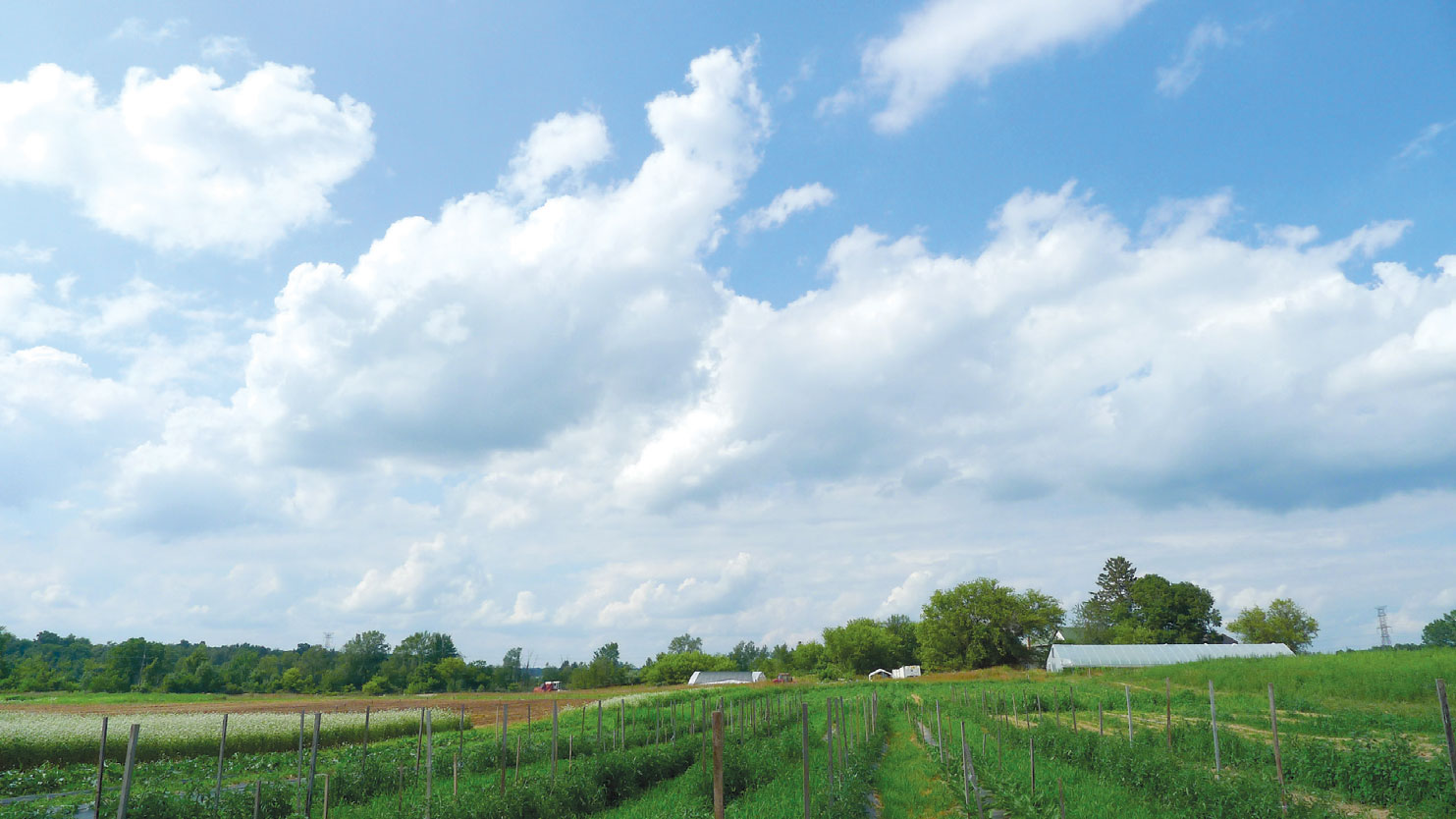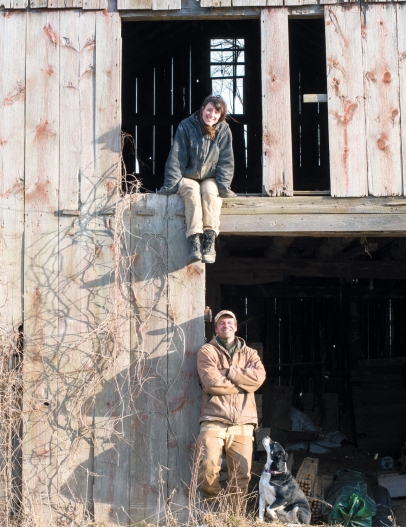Raised in the Garden State
A young farmer pulls up stakes
When I started Whistling Wolf Farm in 2013, I imagined it like an internship I was providing for myself, an opportunity to test ideas accrued from the past three years working on other New Jersey farms. I knew I wanted to be an organic vegetable farmer. I also knew that I had a lot more to learn. I leased some land in Pittstown, to make mistakes at my own expense and learn from them. With my trusty companion, Exie the dog, I battled through my first growing season, collapsing triumphantly at the end of November, tired but ready to lay the groundwork for year two.
Jim Neumann, my husband and co-conspirator, was there for all of it. He talked through variations of farm business plans, debated the feasibility of making a living farming and supported and loved me through various levels of exhaustion. Toward the tail end of Whistling Wolf ’s second year, Jim joined the team full-time.
We continued farming in Pittstown for two more years, investing in the farm by building our soils, markets, community relationships, adding infrastructure and discovering how to manage a farm as a married couple. Partway through our third year, reality sunk in. We needed land tenure to guarantee we would still have access to the land when our investments in soil fertility and health began to pay off. Without long-term access to our farm site, it would have been foolish to build the kinds of permanent infrastructure imperative to a vegetable farm business. This stubborn reality, combined with the deep longing to live on the land we worked, launched our search for farmland.
We considered some parts of Pennsylvania, but the primary contenders were central New Jersey, where we built our business and where Jim’s immediate family lives, and Southern Michigan, close to some of my family. It was a race to see which state would produce a farm with prime vegetable soils that we could afford. In New Jersey, of course, land values are high.
After a year of limbo and obsessive, essence-sucking internet searches, just as our fourth growing season was ramping up, we found our farm in Michigan: a mixture of sandy loam soils, woods and wetlands, with a hoop house, a variety of decrepit barns and a house inhabited by raccoons, all on 54 acres. We were able to get a loan for the purchase and to restore the main systems in the house.
This made for a grueling 2016 with the most delicious carrot at the end. We continued meeting the demands of our New Jersey farm: planting, caring for the crop, harvesting and going to market. Simultaneously, we developed our opportunities in Michigan. We evicted the raccoons and worked on the farmhouse, managed the work that we contracted out, planted a quarter acre in garlic, planted the hoop house for winter harvest, secured market access, sold our house and moved home and farm. All of this was as long and hard as it sounds, and it felt like it.
Jim and I lived separate lives; he managed the repairs while I managed the farm preparations. We were rarely in the same state. We traveled alone and took the I-80 route across Pennsylvania with the frequency of truckers, sometimes making the 22-hour round trip every week. Once I got stuck working in Michigan until midnight because of an unexpected frost. I took a nap and was on the road to NJ by 3am so I could harvest for the Saturday markets. When we finally crash-landed and woke up in January, it was already time to prepare for the 2017 growing season.
The farm was beautiful the whole time. Most nights in Michigan, I took a few moments to be still and appreciate that my biggest dream was coming true. I was being given the chance to develop a deep relationship with a living place—a forest, a habitat, a microcosm. The feeling of gratitude was so big it brought me to tears. I wondered if that feeling would fade, if the grind of the farm season would dull the sheen of joy.

PHOTOGRAPH: PETER NEUMANN
We evicted the raccoons and worked on the farmhouse, managed the work that we contracted out, planted a quarter acre in garlic, planted the hoop house for winter harvest, secured market access, sold our house and moved home and farm. All of this was as long and hard as it sounds, and it felt like it.
We set out to do everything we had once done for Whistling Wolf. We unpacked “farm-in-a-box”—the 40-foot shipping container filled with pieces of our NJ farm to within a few feet of the ceiling. Like a spelunker, I regularly donned a headlamp and climbed along the top of the pile to mine out specific tools buried in the back. We named the property Lake Divide Farm for the way the Huron and Upper Grand watersheds divide it in half, and we set about building community, infrastructure and understanding of the land. It was a lot of work. At times I thought I would burn out.
Last fall, I was begging for mercy when I realized it was impossible to complete the season’s remaining work. We had frost-sensitive crops to harvest, machine maintenance, clean-up and planting to do, along with a hoop house to build. To survive, we reduced our to-do list to three tasks (in addition to our five weekly markets): harvest the rest of the potatoes, complete the hoop house and plant the garlic. Completing anything else was considered a bonus.
October ended and so did two markets, loosening the schedule. We fit a few bonus items in, and one by one, the big three dropped from the list. I was able to lift my head and see our hard work laid out around us. The farm paths we had mapped out were now imprinted on the ground. We built a greenhouse, a wash station, two walk-in coolers, an electric deer fence, equipment storage and three additional hoop houses. Our labor had resulted in tangible movement toward our end goal of having an economically and environmentally sustainable farm.
Jim and I get homesick for our irreplaceable network of family and friends in New Jersey. We were afraid that there would be no comparable farming community here. Fortunately, that is not the case, but it is going to take time, as starting over always does. We have a few friends now and are slowly settling in. We love our farm and know we will be happy here. And we know that all of our success here is because of the love and support we received while we grew up on Whistling Wolf Farm. Thank you, Garden State, for raising us. We love you.
EDITOR’S NOTE: According to “Leasing Farmland in New Jersey: A Guide for Landowners and Farmers,” a report issued by the NJ State Agriculture Committee in 2013, close to 40% of the land farmed in New Jersey is farmed by someone who does not own it, which mirrors a national trend.




